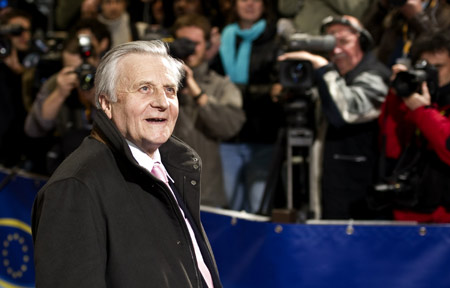
Jean-Claude Trichet, president of the European Central Bank, arrives for the European Union leaders' euro-region summit in Brussels, Belgium, on Friday. [Bloomberg]
|
 |
|
Jean-Claude Trichet, president of the European Central Bank, arrives for the European Union leaders' euro-region summit in Brussels, Belgium, on Friday. [Bloomberg] |
Analyst says that lower value is 'just what the doctor ordered'
COPENHAGEN - The euro's 21 percent tumble from last year's high has left the currency above the average level since its creation in 1999 and stronger than its predecessor, the deutsche mark.
Even as the euro weakened 2.5 percent last week against the dollar and fell below $1.20 for the first time since March 2006, it remains higher than the close of $1.1837 on Jan 4, 1999, the first Monday of trading after its introduction, and stronger than the $1.1842 monthly average since inception.
A Bloomberg composite of the currencies comprising the euro averaged $1.1945 through last week from the end of 1988, when Europe's foreign-exchange market was dominated by the German mark.
While former Federal Reserve Chairman Paul Volcker said last month that Europe's widening debt crisis may cause the 16- nation currency to dissolve, European Central Bank President Jean-Claude Trichet said on May 31 the euro is keeping its value in a "remarkable fashion." Policy makers may welcome the drop to boost exports, Goldman Sachs Group Inc and Morgan Stanley said.
"Many would say this weaker euro is just what the doctor ordered," said Alan Ruskin, head of foreign-exchange strategy at Royal Bank of Scotland Group Plc in Stamford, Connecticut. "From a levels standpoint they should have absolutely no complaints and they can live with a euro this low."
A Deutsche Bank measure weighted according to the region's biggest trading partners shows the euro is 2 percent higher than its average since 2001.
That hasn't prevented speculation that the EU is in danger of collapse as its leaders unveiled an almost $1 trillion loan package last month to halt the slide in the euro and local bonds after Greece's budget deficit rose to almost 14 percent of gross domestic product, exceeding the group's 3 percent limit.
The currency received more shocks when Fitch Ratings cut Spain's 'AAA' credit grade and officials in Hungary, while not part of the euro, said the nation's economy is in a "very grave situation", and talk of a default isn't "an exaggeration".
"You have the great problem of a potential disintegration of the euro," Volcker said in a May 13 speech in London.
"The essential element of discipline in economic policy and in fiscal policy that was hoped for" with the creation of the euro has "so far not been rewarded in some countries," he said.
The weaker euro will boost the EU's GDP as much as 1 percentage point in 2011, compensating for the brake on growth from lower spending, according to Thomas Stolper, an economist at Goldman Sachs in London. GDP expanded 0.2 percent last quarter from a 2.5 percent contraction a year earlier.
The euro and the dollar are the world's most-traded foreign-exchange pair.
"Bringing about the end of the euro is something that one cannot plausibly conceive of at the moment," Helmut Schlesinger, head of the Bundesbank from 1991 to 1993, said in a May 25 telephone interview from his home in suburban Frankfurt.
European manufacturers are already starting to reap the benefits of a lower currency.
Exports in the 16 euro nations rose 2.5 percent in the first three months of 2010 from the fourth quarter of 2009, when they increased 1.7 percent, the EU's statistics office in Luxembourg said June 4.
The gradual weakening of the euro toward parity with the dollar over the next year may save the shared currency by helping countries such as Greece, Italy and Spain regain competitiveness, said Nouriel Roubini, the New York University economist who predicted the financial crisis.
"An orderly fall in the value of the euro is the only thing that is going to prevent a breakup of the monetary union," Roubini said June 5 in Trento, Italy.
Bloomberg News